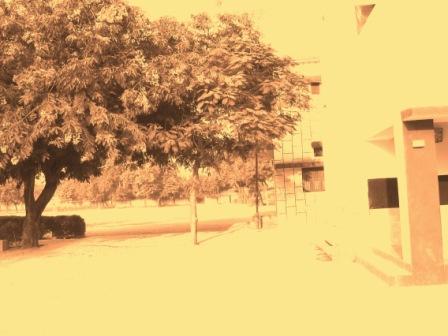At the Splendor...I Stared.
By Jigar Moradabadi
[Interpretive translation of the Urdu by Siyaah]
At the splendor, with an appreciative, capacious gaze, I stared
What else could I see- but at her, I stared. [1]
At my own reflection, presented to my gaze, I stared
A mirror there was face-to-face, wherever I stared. [2]
In her sanctuary of grace, where could I stand-
At the imprints on the veil at the door, I stared. [3]
Some such nights of separation went by as well-
As if it were her, presented to my gaze, at whom I stared. [4]
With every glance, the grandeur of beauty changed, O Jigar
At every glory of the transforming world, I stared. [5]
----
Translator's Notes
One aspect of note in Jigar's ghazals is his command on the rhyme- often, he has two opening couplets (rather than the mandatory one for the typical ghazal) with all verses in rhyme.
Translating this was much tougher than it first appeared. The words had to be very precise in terms of their meanings in several places, yet had to be open to interpretation in two ways- for an earthly beloved, and for the Spiritual as well (the word 'her' can be replaced with 'Him' for that effect - in Urdu, the two words are the same). Suggestions for improvements are most welcome.
[1] jalwa: splendor; ba-qadr: showing the proper respect, admiration and appreciation - valuing something at its proper worth; zarf: capacious, being able to hold much. I chose 'I stared' to convey the sense of wonder and almost helplessness conveyed through 'dekh-te rahe'.
[2] ru-ba-ru: face-to-face.
[3] hareem-e-naaz: hareem means santuary or sacred place, house, and often also refers to the enclosure of the sanctuary at Mecca. Naqsh-o-nigar: decorations, engravings, designs, imprints. I prefered 'imprints' as it also suggests that what is seen on the veil is a manifestation or imprint of the sacred that is hidden from sight- one sufistic interpretation here would be that the world is an imprint of the Creator who is veiled from wordly sight.
[4] firaaq: separation.
[5] lehza: a look, a glance, a moment. Jahaan-e-digar: digar means next, other, another. This was the most difficult couplet to translate - Jigar's choice of every word gives it a variety of meanings. Jahaan-e-digar could be read as the 'next world'. Coupled with the first line, it could imply the various aspects of the beloved's beauty that the poet observed with every glance made him compare it to 'other world'-like beauty. Yet, it could also imply that the poet, through witnessing the changing beauty of this world in general, had a spiritual experience of 'transition to' the other world. I used 'transforming world' for jahaan-e-digar as it preserves all interpretations and brings the poet's experience alive through the words.
There is much more here, open to interpretation.
Subscribe to:
Post Comments (Atom)






6 comments:
With my limited urdu vocab, I could've never understood these four-word combinations: baqadr-e-zarf-e-nazar, Naqsh-o-nigaar-e-parda-e-dar. I owe a part of my interest in urdu poetry to your blog. Really.
Superb translation. This one was tough, I must add. Where do you get your inspiration from? I can never translate :(
vik: thanks for the kind words. i do this as much for myself as for anyone else...; those persianized combinations are actually quite easy once one gets the hang of where to use 'o' (and) and 'e' (of).
tapasya: i guess the inspiration is partly from my own desire to understand these - when one translates, one has to face and grapple with every nuance of the meaning. but it is also about bridging the multiple worlds that we all inhabit these days...
thanks so much Siyaah. beautiful contribution.
blessings to you.
thanks to you for such great translation of this lovely shairi..
Hello Siyah,
I was searching for the meaning of a couple of words in Google such zarf e nazar and thanks to your blog I found the meaning. I would, however, like to add, from the perspective of spiritual understanding of poetry more so Urdu poetry, which is deeply influenced by religion therefore, as you have also highlighted in your explanation, the use of pronouns her and or him restrict the greater understanding of the or for that matter any ghazal, though this one in particular. Although, the understanding of poetry is subject to the reader's perspective, however, the meaning is ever eloquent without these restrictions. Although, the meaning of the word ghazal means talking about women still there are ghazals where it would be difficult to relate with women, Mirza's ghazals and Mir's ghazals are a classic example. Also I would like to mention, very humbly, mine is a attempt to enhance the poetry reading experience. Pila de oak say saaki, pyala deta hai na de sharaab to de.
Post a Comment